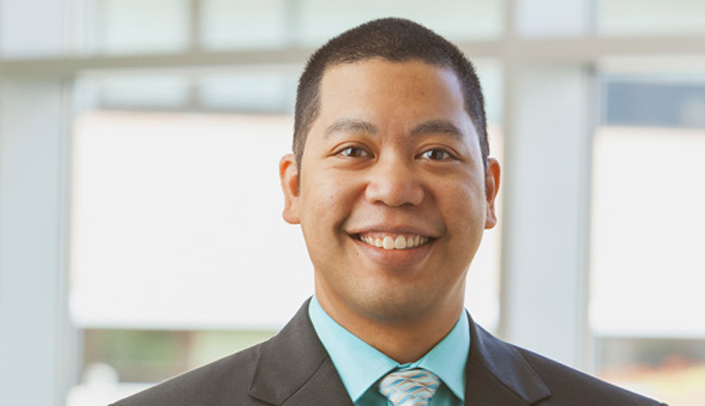Music filled Christopher Bingcang’s childhood.
Growing up in Lexington, Ky., the UNMC otolaryngologist was surrounded by the sounds of bluegrass, his mother’s singing and his father playing the violin and guitar.
Music was everywhere.
Dr. Bingcang even thought he might one day become a professional musician, and spent time living in Nashville.
“I took violin and guitar lessons and majored in guitar as an undergrad in college, but it was too expensive at the time to pursue a master’s degree so I decided to pursue a degree in medicine instead,” he said.
Either way Dr. Bingcang’s parents were happy with his choice. After all, besides his parents’ musical talents, his father also was an anesthesiologist and his mom a child psychiatrist.
It’s the perfect blend for the assistant professor in the department of otolaryngology-head and neck surgery at UNMC, whose patient population includes musicians and professional singers.
“I love helping a patient who relies upon their voice professionally to regain their vocal abilities,” Dr. Bingcang said.
And he still finds time to dabble in music, playing electric bass guitar for his church choir.
Tonight, Dr. Bingcang will show everyone just how amazing the human vocal cords are when he scopes a professional singer’s voice box while he sings during an Omaha Science Cafe presentation at the Slowdown, 729 N. 14th St. The cafe is free and begins at 7 p.m.
“I think because people can’t see their vocal cords it’s hard for them to appreciate what an amazing instrument it is,” he said.
Dr. Bingcang said it’s important for everyone to understand how to maintain vocal health.
And for vocal athletes — preachers, singers, actors — it’s especially important for those individuals to take care of their health so things like hoarseness or illness don’t sideline them, he said.
Dr. Bingcang treats patients for hoarseness, swallowing and breathing problems. He said the top three things people can do to improve their vocal health: stay hydrated, take care of your overall health and, if you are a smoker, stop.
“You can’t just buy a new set of vocal cords like you can if the strings on your guitar break, so it’s best to take care of yourself and see a physician if you do develop a problem,” Dr. Bingcang said.

Chris Bingcang is one of the best!. It is an honor to work with people like him !